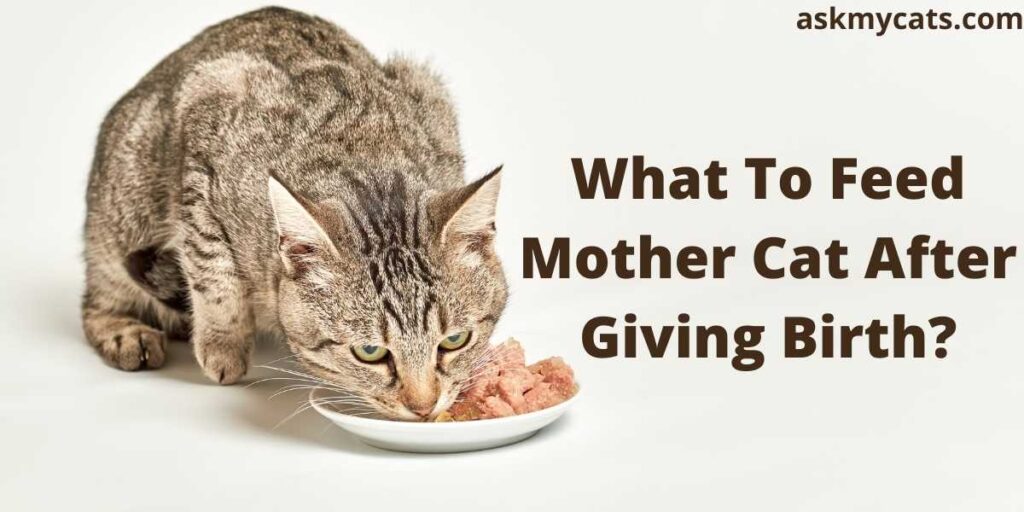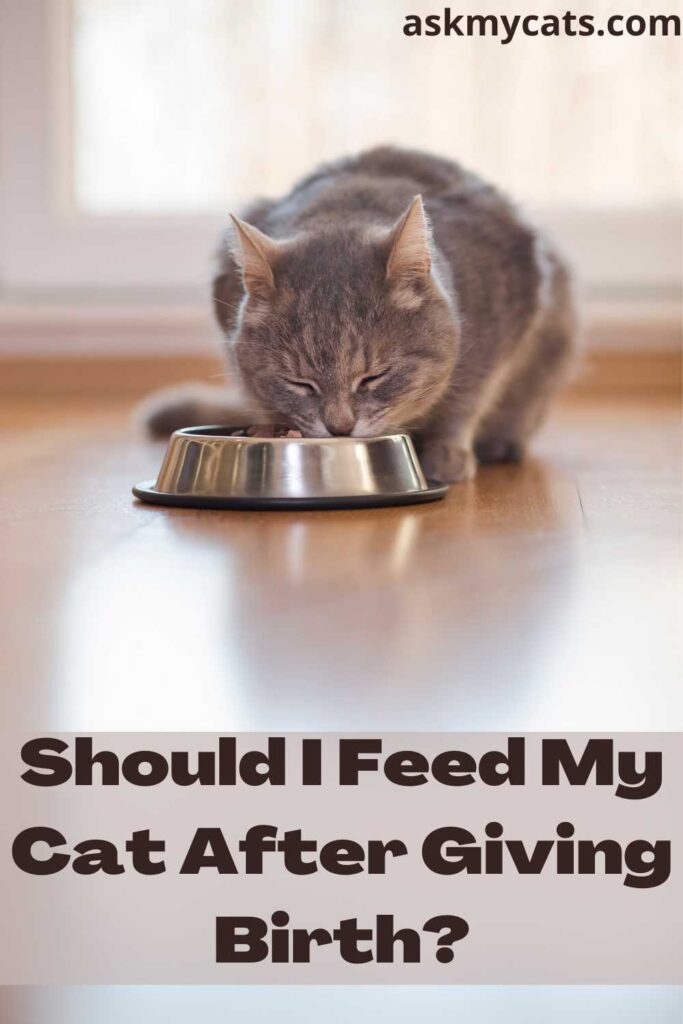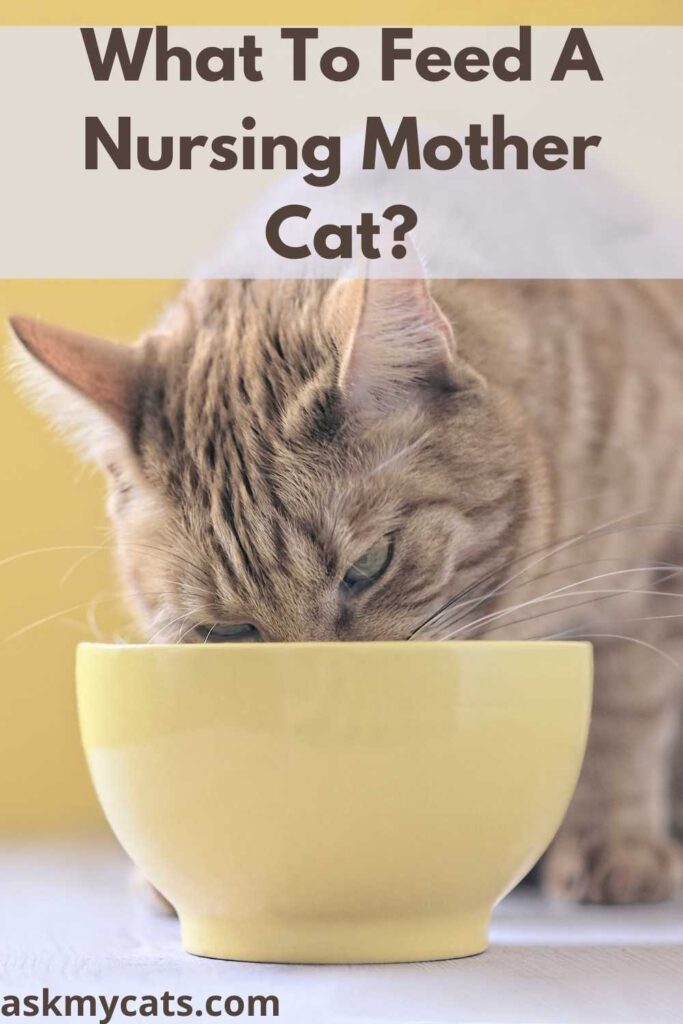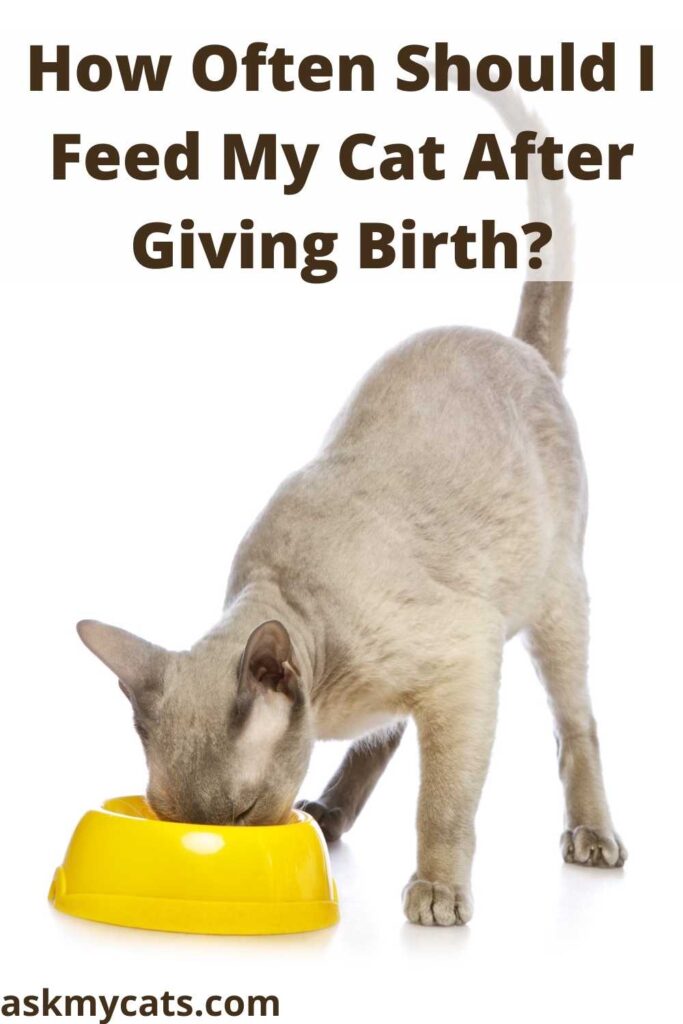If your female cat is pregnant or has recently given birth and is nursing her kittens, you must feed her food that will sustain her and her kittens both before and after they are born.
So, what to feed the mother cat after giving birth.
After giving birth mother cat should be fed high-calory food. While the kittens are developing and growing, your cat will require high-calorie food to both nourish the kittens and maintain herself healthy. Because lactation is a physically taxing process for a cat, you’ll need to feed her high-calorie food while she’s feeding her litter.
This article will tell you all about the food that is needed for a nursing cat.


Give Your Cat the Perfect Day
Get the Free Ebook!
Should I Feed My Cat After Giving Birth?
Yes, you should feed your cat after giving birth.

Nursing cats are similar to any other cat, but they do have a few unique requirements.
The key issues are ensuring that yours has enough food and a safe area to nest.
You should also keep a close eye on the health of a nursing cat and her kittens to verify that everything is going smoothly.
Give a pregnant cat enough food to gain weight. While nursing their babies, mother cats usually lose weight.
You should start feeding the cat more than usual in the third trimester of her pregnancy to prevent her from losing too much weight.
Feeding her too much before the third trimester of her pregnancy can cause her to gain weight, making giving birth more difficult.
By the end of her pregnancy, a mother cat’s body weight may have increased by 40 to 50 percent.
Feed greater quantities to young mother cats. You should continue to feed your cat more than she normally eats after she gives birth.
She’ll require more calories because she’s now giving her kittens energy by nursing them. The amount of food required by a nursing cat varies according to the size of its litter.
Cats who are nursing more than two kittens often require 2 to 2.5 times the average amount of calories.
A 10-pound cat with four kittens needs 603 calories per day. A 15-pound cat with four kittens needs about 851 calories per day.
Allow your cat unrestricted access to food. Allowing your cat to graze at her leisure is one of the simplest ways to ensure that she gets enough nutrients.
Keep her food bowl full and accessible at all times. Wet food is preferable since it contains more protein. Allow your cat free access to dry food if she is used to it or if the wet food spoils too rapidly.
You might like to read How To Fatten Up A Nursing Cat?
What To Feed A Nursing Mother Cat?
A nursing mother cat should be fed a high calory and protein diet.

When your cat is pregnant, it’s exciting, but you don’t want to lose sight of the significance of giving the optimum nourishment for both the mother and her offspring.
Surprisingly, after giving birth and during nursing, a mother cat loses on average 40% of her body weight.
As a result, physicians advise providing high-quality, high-protein, calorie-dense kitten food to both the mother and the kittens.
Ascertain that Mom has a sufficient supply of both wet and dry meals.
Mother cats who are nursing should eat a high-quality kitten formula meal.
Don’t be afraid to feed her canned tuna, chicken, or salmon if she’s a picky eater. Contrary to popular perception, cow’s milk is impossible for cats to digest and frequently causes major stomach discomfort.
Her calorie intake must stay quite high in order for her to continue feeding her kittens. Make sure she has access to fresh water at all times.
Make sure you have food designed for nursing cats on hand. There are some cat foods that are better than others.
You might also like to read about Why Is My Cat Not Eating After Giving Birth?
Look for cat food that is specifically created for nursing cats, or one that is formulated for cats of all ages.
Look for cat food that has been certified by the Association of American Feed Control Officials to ensure quality (AAFCO).
Make sure the cat is getting adequate protein. To be healthy and provide nutrients to her kittens, a nursing cat will require a lot of protein.
Protein is usually found in high-quality cat food. If her kittens are very boisterous or mobile, though, it could indicate that the mother isn’t getting enough protein.
If in doubt, give the mother cat kitten food while she is nursing. Kitten food contains more calories, calcium, and protein than human food.
Protein can be added to your cat’s regular meal. Your cat can continue to consume their regular food during the early and middle stages of pregnancy.
However, you should offer extra protein to help your kitten grow well. Boil small chunks of chicken, beef, fish, or egg and add them to your cat’s dry or wet food to achieve this.
Cats, especially pregnant and nursing ones, can be fussy eaters. Try a variety of proteins until you find one that your cat enjoys.
As the mother cat’s body grows the kittens, the increased protein will provide her with strength and energy. The mother will require a lot of protein during her pregnancy and nursing time.
Ensure that your cat has access to food at all times. Her meals will become more frequent after giving birth.
As a result, ensure sure food is always available for your hungry cat. You can leave food out instead of feeding her at specific meal times.
If wet food is left out too long, it may spoil. You can avoid this problem by putting out a tiny amount of wet food and then waiting until your cat finishes it before adding more.
You would also like to read Cat Losing Weight After Giving Birth: Reasons & Solutions
How Often Should I Feed My Cat After Giving Birth?
After giving birth the cat should be fed three times daily.

After your cat gives birth, feed her kitten food three times a day.
For the first few days after giving birth, the queen will most likely be weary, low on energy, and have little appetite.
Her hunger, on the other hand, will soon return. Continue to feed her the high-quality kitten food and add additional protein as needed.
Three times a day, at regular intervals, give the cat a plate of this food.
If your cat continues to gain weight after giving birth, you may need to reduce the amount of food she eats. Overfeeding your cat to the point of obesity is not a good idea.
Queens will lose roughly 40% of the weight they gained during pregnancy when they birth. Due to the strain exerted on the queen’s body during lactation, the remaining weight will be lost.
Because she will have more room in her abdomen once the kittens are born, the queen can increase her food intake, but the energy density of the food must be high, or she will not be physically able to consume enough to maintain milk production, weight, and body condition.
Feedings can be fine-tuned based on the queen’s bodily state, which is assessed on a regular basis.
Interesting Read: Why Is My Cat Still Fat After Giving Birth?
Lactation feeding, like pregnancy feeding, is best achieved with a highly digestible, high-quality kitten formula.
Peak milk production and the queen’s peak energy needs occur between weeks three and four of lactation, although peak food requirements come between weeks six and seven of lactation.
As the kittens near weaning age, keep in mind that they are also eating the queen’s food.
Unless the cat only has one or two kittens, free-choice feeding during the first three to four weeks of lactation has numerous advantages.
The queen can eat on her own timetable, consuming smaller portions of food each time she eats, and the kittens can start sampling solid food as soon as they are ready (at about three weeks of age).
Give your cat calcium-rich food. It’s critical that your mother cat eats plenty of calcium-rich food soon after giving birth.
Calcium will boost the mother’s milk production, which will assist bone development in the kittens.
Look for canned cat food with high calcium content in the nutritional facts. You can also give your mother cat calcium supplements under the guidance of a veterinarian.
Before giving your cat calcium supplements, see your veterinarian. This is a fairly routine practice that ensures your mother cat gets adequate calcium and passes it on to her offspring. Calcium supplements should be accessible at a pet store near you.
Once the kittens have been weaned, return your cat to adult food. The mother cat will require the protein and nutrients provided by the kitten chow while she is breastfeeding and feeding her kitten milk.
You can transfer the mother cat back to adult food once the kittens have weaned (typically around 6–10 weeks after birth).
Find out How to Wean a Stubborn Kitten?
Mix a small amount of adult food with kitten food to achieve this. Over the course of a week, gradually increase the percentage of adult food until the cat has fully transitioned to adult food.
You don’t need to offer her extra protein if you reintroduce dry food into the cat’s diet at this stage.
How Much Should A Cat Eat After Having Kittens?
A cat typically needs 2 to 2.5 times more calories than usual. A 10-pound cat nursing 4 kittens need approximately 603 calories per day, after having kittens.
During pregnancy and nursing, it’s vital to feed your cat appropriately. Malnutrition can cause kittens to be born underweight, putting them at risk for a variety of health problems and lowering their chances of survival.
The goal is to provide the mother and her kittens with the best possible nutrition.
Interesting Read: Why Is My Pregnant Cat Not Eating?
Here are certain nutritional priorities in particular:
- Increased energy from calories for the kittens’ growth and the mother’s milk production
- Increased protein for kitten growth and development
- Increased fat to meet the mother’s high-calorie need
- Calcium and phosphorus supplementation for kitten bone growth and mother’s milk supply
- High digestibility means more calories can be obtained from a smaller amount of food.
Nursing cats require a lot of energy, thus more energy and fat are vital. The most energy-intensive period of a cat’s life is nursing.
Nursing cats require 2 to 6 times the amount of energy that a healthy adult cat does.
The amount of food eaten that is actually absorbed by the cat’s body is referred to as digestibility.
Because energy requirements are high and there is less physical space in the tummy of pregnant cats, excellent digestibility is critical.
After the kittens are delivered, keep food available for the mother at all times. This will eventually aid in the weaning of the kittens to a regular diet and give the mother the high-energy food she will require during this period.
Check out How To Make A Cat Produce Milk?
Frequently Asked Questions
How to care for a nursing cat?
Examine the mother cat for diseases. Feline leukemia virus (FeLV) and feline immunodeficiency virus (FIV) are both viruses that can infect cats. These infections can be disseminated by a mother passing them on to her kittens through her milk. You can take the kittens to the vet when they are around 1-2 weeks old for an examination and, if necessary, treatment. FeLV and FIV testing on the mother can predict the likelihood of the kittens contracting these infections.
When do I wean my kittens?
Weaning is frequently done in stages. Between 3 and 4 weeks of age, most kittens start consuming solid food. Weaning should be finished between the ages of 6 and 10 weeks. Start by removing the mother and kitten for a few hours at a time to begin the weaning process. The kittens’ reliance on their mother and her milk will progressively diminish as a result of this. Both the mother and the kitten should have their own separate area with a litter box, food, and water.
What are some health issues in newborn kittens?
Kittens are the most susceptible to intestinal parasites. Infectious disorders, including respiratory infections, and congenital diseases are other health issues that young kittens face. When a kitten fails to thrive, it is known as fading kitten syndrome. It could be a symptom of the syndrome if you notice one of the kittens is generally more lethargic and sleeps a lot more than its siblings. A veterinarian who specialized in kitten care should see that kitten right away.
Final Words
There are many cat foods out there that are suitable for the nursing mother, so choose the correct one that your cat likes and feed her that to aid her in the nursing phase.
If you have any questions, ask us in the comments section.
Also, check out Why Is My Nursing Cat Always Hungry?
